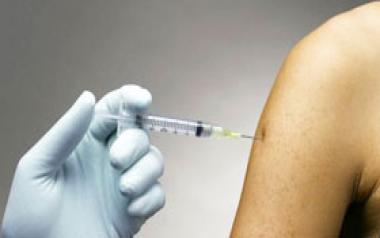What is Immunization?
Immunization protects children (and adults) against harmful infections before they come into contact with them in the community.
Immunization uses the body's natural defence mechanism - the immune response - to build resistance to specific infections. Nine diseases can be prevented by routine childhood immunization - diphtheria, tetanus, whooping cough, poliomyelitis (polio), measles, mumps, rubella, Haemophilus influenzae type b (Hib) and hepatitis B. All of these diseases can cause serious complications and sometimes death.
Immunization is given as an injection or, in the case of polio vaccine, taken as drops by mouth. Immunization helps children stay healthy by preventing serious infections.
Immunization and vaccination
Technically 'vaccination' is the term used forgiving a vaccine - that is, actually getting the injection or swallowing the drops. 'Immunization'is the term used for the process of both getting the vaccine and becoming immune to the disease as a result of the vaccine. Most people use the terms 'vaccination' and 'immunization'interchangeably but their meanings are not exactly the same because immunity follows vaccination in most, but not all, cases. For the purposes of this book, we have always used the term 'immunization' because this is the expression most commonly used in the community.
How does immunization work?
All forms of immunization work in the same way. When someone is injected with, or swallows, a vaccine, their body produces an immune response in the same way it would following exposure to a disease but without the person getting the disease. If the person comes in contact with the disease in the future, the body is able to make an immune response fast enough to prevent the person getting sick.
What is in vaccines?
Some vaccines contain a very small dose of a live, but weakened form of a virus. Some vaccines contain a very small dose of killed bacteria or small parts of bacteria, and other vaccines contain a small dose of a modified toxin produced by bacteria. Vaccines may also contain either a small amount of preservative or a small amount of an antibiotic to preserve the vaccine. Some vaccines may also contain a small amount of an aluminium salt which helps produce a better immune response.
How long do immunizations take to work?
In general, the normal immune response takes several weeks to work. This means protection from an infection will not occur immediately after immunization. Most immunizations need to be given several times to build long lasting protection. A child who has been given only one or two doses of diphtheria-tetanus-pertussis vaccine (DTPa) is only partially protected against diphtheria, pertussis (whooping cough) and tetanus, and may become sick if exposed to these diseases. How long do immunizations last? The protective effect of immunizations is not always life-long. Some, like tetanus vaccine, can last up to 30 years, after this time a booster dose may be given. Some immunizations, such as whooping cough, give protection for about five years after a full course.
Is everyone protected from disease by immunization?
Even when all the doses of a vaccine have been given, not everyone is protected against the disease. Measles, mumps, rubella, tetanus, polio and Hib vaccines protect more than 95% of children who have completed the course. Three doses of whooping cough vaccine protects about 85% of children who have been immunized, and will reduce the severity of the disease in the other 15% of children (who have also been immunized), if they do catch whooping cough. Booster doses are needed because immunity decreases over time. Three doses of hepatitis B vaccine protects over 95% of children.
Why do children get so many immunizations?
A number of immunizations are required in the first few years of a child's life to protect the childagainst the most serious infections of childhood. The immune system in young children does not work as well as the immune system in older children and adults, because it is still immature. Therefore more doses of the vaccine are needed. In the first months of life, a baby is protected from most infections by antibodies from her or his mother which are transferred to the baby during pregnancy. When these antibodies wear off, the baby is at risk of serious infections and so the first immunizations are given before these antibodies have gone.
What are the side effects of immunization?
Common side effects of immunization are redness and soreness at the site of injections and mild fever. While these symptoms may concern you and upset your child at the time, the benefit of immunization is protection from the disease. Paracetamol might be required to help ease the fever and soreness. For more information, refer to Common side effects of immunization and what to do about them. Other side effects are very rare but if they do occur, a doctor should be consulted immediately.
Why should I have my child immunized?
There are two reasons for immunizing everyone in Australia:
| Title | Size | Detail |
|---|---|---|
| Immunization Schedule-2016 | 55.66 KB |
